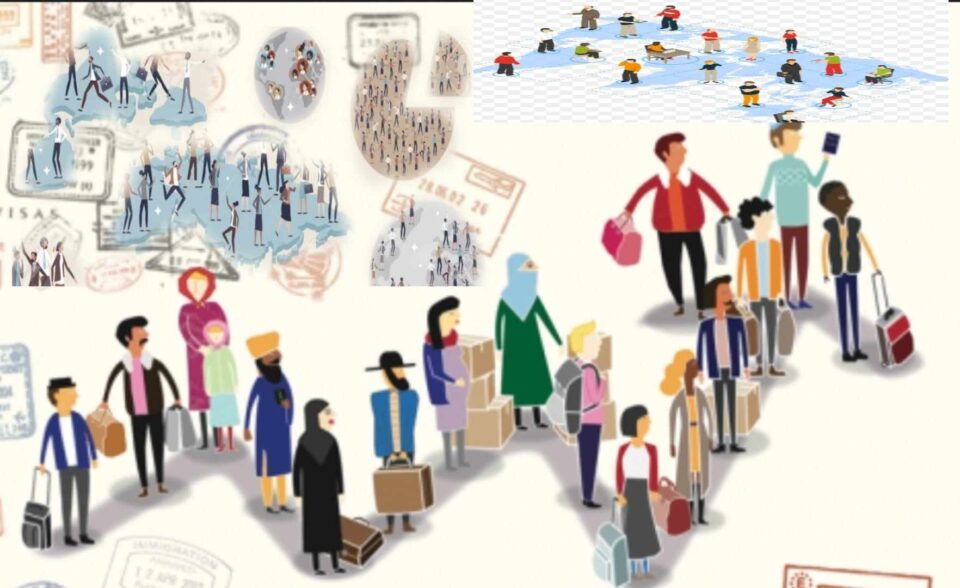 It is written by *Evmorfia Kipouropoulou.
It is written by *Evmorfia Kipouropoulou.
Population movements have been a reality since the creation of human societies and, therefore, the phenomenon of migration is as old as human history. Immigration is undoubtedly a complex phenomenon with many dimensions, which has been, and is constantly being, investigated. But in the reality of migration and the diaspora, the protagonists are the migrating populations themselves, people who, during both their movements and their settlement in new environments, form, manage,
redefine and negotiate their identities.
The processes for the formation of identity go through the following stages:
a) assimilation of the individual in the social group,
b) harmonization of the individuality with the features of the social group, creating a sense of continuity in time and space and
c) evaluation aimed at cultivating a sense of personal and social value of the individual in the context of social interactions.
Positive self-evaluation is considered important. Positive selfevaluation leads to the immediate and successful adoption of roles and to the acceptance of the beliefs and values of the social groups. The threat to a group’s identity – and consequently its negative self-esteem – stems from the “inferiority” attributed to it, as a result of comparison with members of other social groups. The internalization of negative social identity results from the internalization of negative stereotypes about self-image and fromthe adoption of derogatory assessments, as is the case with members of minority groups [4].
One form of collective identity is national identity. National identity is a multidimensional social construction that is formed through the representations of a group for itself and the various “national others”. National Identity for Robyn Holmes [7] is used to demonstrate an individual’s ability to integrate himself/herself into a national group as he or she adopts feelings and attitudes that reflect the values and history that group members share and recognize as common.
National identity is a symbolic construction that shapes the perception of a national group about the social world. An important means in this construction is “national memory” through national discourses, which are characterized by the expression of a common origin in order to legitimize the formation of the nation-state as an independent political entity [10, 8].
National identity is a category of collective identity, according to which an observer classifies a subject and which refers to content shared by the members of a nation, expressing qualities found in the literature as cultural identity, with which is declared the content of national identity [4]. Billig [2] advocates that national identity is “a brief description of the ways in which we talk about ourselves and the community” and which are related to lifestyles, and he suggests that in the study of national identity the appropriate research question is not “What is national identity?” but “What does it mean when we claim to have a national identity?”.
The concept of nation and ethnic group is definitely involved in the formation of national identity by the subject. The understanding of the use of the term “ethnic group” is due to the studies of the Scandinavian anthropologist Fredrik Barth [1], according to whom the phenomenon of nationalism divides the social space in two sides, the“Us” and “Them”. Ethnic identity is a consequence of the social relations of groups and not of the primary social characteristics of a population group. Ethnic groups do not have a permanent and timeless nature but change depending on the circumstances.
In the field of post-colonial studies, theories that saw the nation as an “autonomous structure of a sovereign subject” were criticized. Instead of creating an imaginary community, there was the creation of a heterogeneous community that is either shaped as a reflection of Western colonial politics or based on its Orientalist imagination. This critique views nation either as a diasporic phenomenon which contributed to the formation of the nation, or as the nation from the part of the immigrants, who are not taken into account in the academic theories of the formation of nations [9].
What we observe today is not the dissolution of nations but the rearrangement of the relations that constituted the nation-state [9]. The nation today is transformed from a political community into a cultural one, where cultural characteristics prevail. Globalization has contributed to this change with the deterioration of political processes, but also the fact that national ideology is not only reproduced by the state but also by market mechanisms.
Added to this is the change in the nation’s relations and its transformation into an “online community”. Nations become more “popular nations” but not more democratic, and less tangible. The nationterritory relationship also becomes problematic due to immigrant communities, which are nations within other nations. These are nations that diffuse outside their national territory, but also many nations that meet in the same territory. The notion of nation, therefore, is liquidated and fragmented.
In modern times, as Hobsbawm claims [6], internationally the growing population movements and the socio-economic change they bring about intensify the defensive response of groups against imaginary threats and lead to expressions of xenophobia and intolerance. The mobilization of national identity is a means to identify those “others” responsible for the uncertainties and modern social disorientation and to act as scapegoats.
The existence of “foreigners” undermines the “exclusive belief that we belong to our people and our country” [6]. Today, with the development of technology, the expansion of economies and international financial centers, and the creation of associations or federations of nationstates, the nation and nationalism tend to lose the basic functions they once exercised.
The nation that is considered as independent from the “nation-state” seems rather unstable and vague. This does not mean that nations and nationalism will not have much weight in the field of education and culture, but they are not sufficient conditions to describe political entities or the identity of groups [6].
Members of minority groups must, like all social subjects, constantly interpret everyday circumstances in the new social context in which they live in order to communicate.
However, the interpretation of everyday situations is particularly problematic for the group of immigrants as, on the one hand, they do not have access to the various forms of oral and mainly written speech and, on the other, they usually experience the conflict of identities since a necessary condition for the development of identity is the smooth social conditions and circumstances under which the development of the language and personality of the individual takes place. The identity of these “imaginary communities of diaspora” is constructed daily through the involvement of different and possibly conflicting discourses in the social environment [3].
In the modern ever-changing globalized space, it is considered to be an important issue to study the dimensions of peoples’ immigrant biography that shape their subjectivity in the construction of both the
educational and social policy’s state programs.
References
[1] Aggelopoulos G. (1997). “Ethnic groups and identities:Conditions and the involvement of their content”. Modern Issues, 63, 18-25.
[2] Billig, Michael (1995). Banal Nationalism. London: Sage.
[3] Brah, Avtar (1996). Cartographies of diaspora. London: Routledge.
[4] Dragona, Th. (1997). “A threatened national identity in Fragoudaki A.&Dragona Th.ed.. “What is our country?” Etnocentricism in Education. Athens: Alexandria, pp. 72-105.
[5] Gotovos, Ε. Α.(2002). Education and Otherness. Athens: Metehmio.
[6] Hobsbawm, Eric (2004). «Mass production of tradition: Europe, 1870-1914» in Hobsbawm, E.& Ranger, T. eds in The Invention of Tradition/transl.Athanasiou Th. Athens: Themelio, pp. 298-345.
[7] Holmes, M. Robyn (1995). How young children perceive race. London: Sage Publications
[8] Konstantinodou E. (2000). National Identity and Education for Peace: the case of the greek school books of History (unpublished doctoral thesis). Thessaloniki: AUTH.
[9] Liakos A.Λιάκος (2005). How did those who wanted to change the world cogitate the nation? Athens: Polis.
[10] Fragoudaki A. & Dragona Th. (1997.) “What is our country?” Etnocentricism in Education. Athens: Alexandria.
*Evmorfia Kipouropoulou
Special Scientist
Department of Primary Education
University of Western Macedonia, Greece

